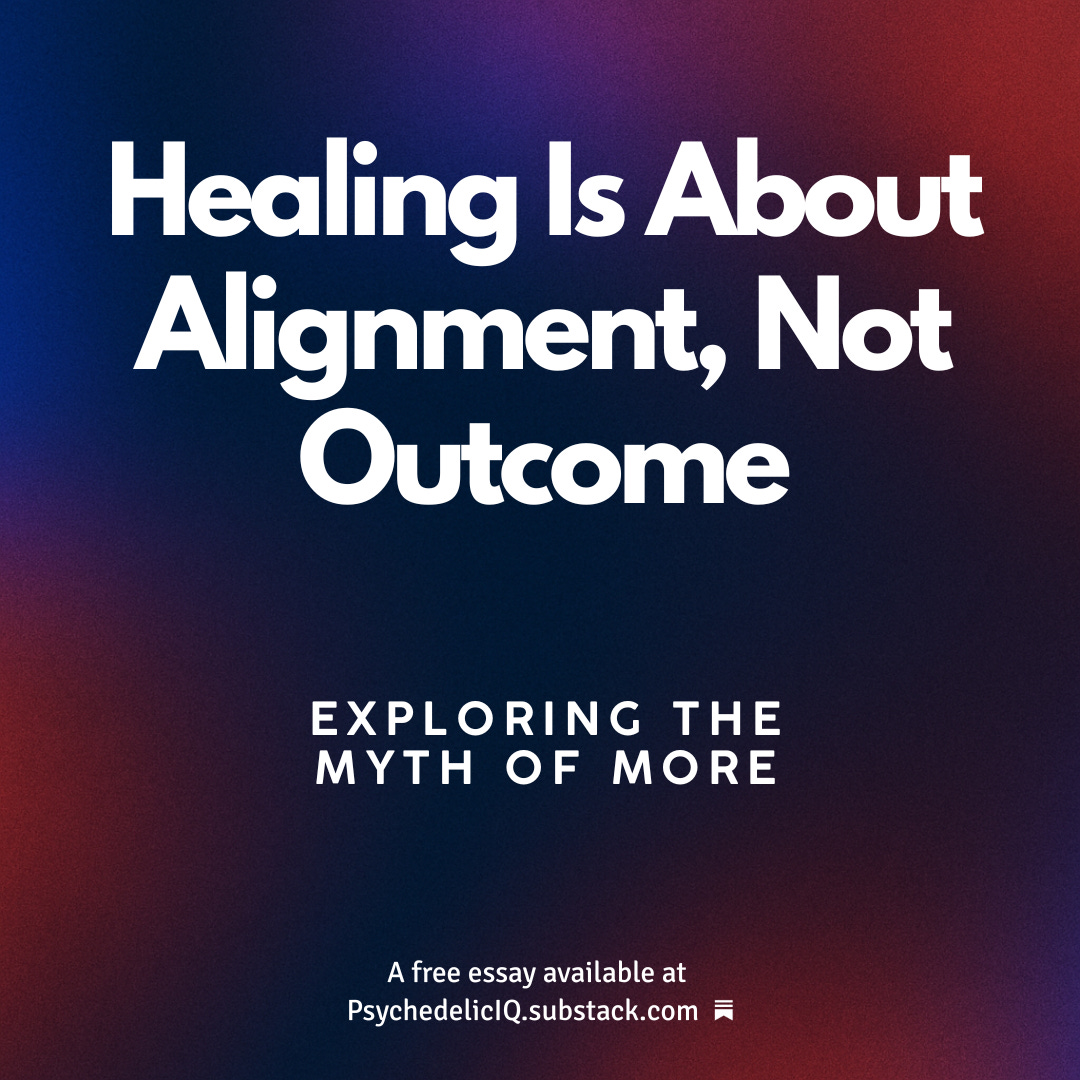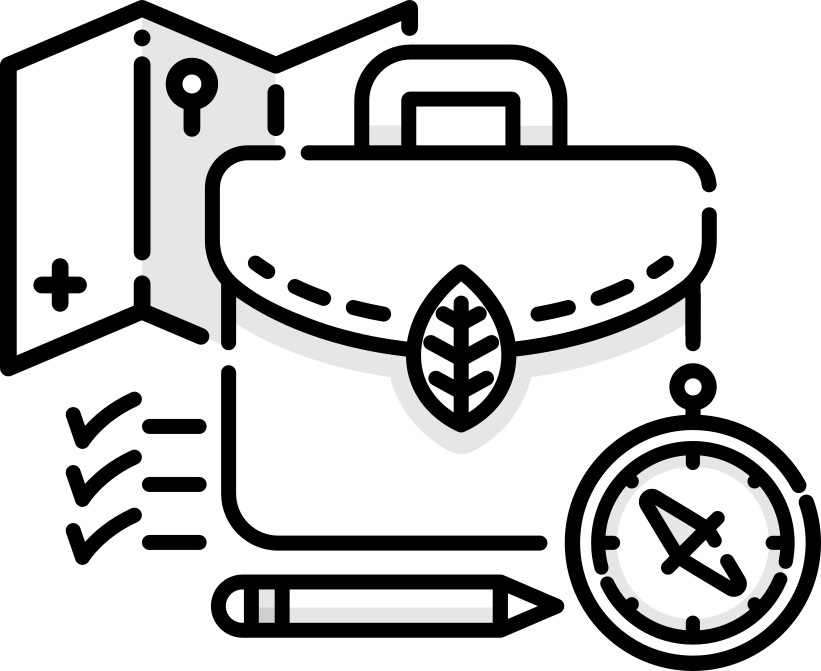Healing Is About Alignment, Not Outcome
Exploring the Myth of More
✨ All of my writing is now free to read. I write because I love it, and I believe that wisdom should be accessible, not hidden behind a paywall. Still, creating thoughtful, high-quality content takes a lot of love, time, and the occasional late-night existential spiral. In the spirit of sacred reciprocity, if something here resonates, consider becoming a paid subscriber or Buying Me a Coffee as a one-time offering to support my work.
Algorithms hate nuance and can’t monetize positivity. I don’t feed the machine with daily posts, so if this content speaks to you, please help it reach someone else by commenting, restacking, or forwarding it to a friend.
We live in a culture obsessed with outcomes. From the time we are children, we are taught that our worth is measured by production: grades, achievements, promotions, possessions. We are rewarded for making things happen—hitting the metric, closing the deal, finishing the to-do list. Productivity is sold to us as the path to security, success, and even happiness.
But hidden in this story is a lie: if we just do enough or make enough happen, then we’ll finally feel at peace. Yet anyone who has ever reached the top of their mountain knows the dirty little secret—outcomes don’t guarantee contentment. You can check every box, buy every toy, win every award, and still feel restless and empty.
This is the story with well over half of my clients. Many of the entrepreneurs I work with have struggled their entire lives trying to build the “dream life” they were told would make them happy, only to find out after they crossed the proverbial finish line that not only were they still miserable, but they also created a whole new set of obsessions and complexities that they now had to manage. Instead of living a life of freedom, free of restriction, they built themselves a prison of their own making, complete with new conditions that are even more difficult to escape.
Healing doesn’t emerge from chasing more. Healing emerges from alignment. Gurdjieff knew this when he said, “You are in prison. If you wish to get out of prison, the first thing you must do is realize that you are in prison. If you think you are free, you can’t escape.”
Alignment vs. Outcome
Across the world’s wisdom traditions, healing is not about bending reality into shape. It’s not about manifesting every desire or reaching every milestone. Healing is about coming into right relationship—with ourselves, with others, with nature, and with the divine order of things.
Outcomes are what the ego chases: recognition, control, certainty, security.
Alignment is what the soul longs for: harmony, balance, and truth.
This is why psychedelics have become such powerful teachers in the modern world. While mushrooms, ayahuasca, or wachuma hold real healing intelligence, they rarely just “fix” us. Instead, they shine a light on where we are out of balance. They don’t deliver the final product; they reveal the blueprint.
And then comes the hard part: integration and activation. Once the medicine shows us where we are out of alignment, it becomes our daily work to bring our choices, relationships, and lifestyles back into harmony.
Ancient Maps of Alignment
Different cultures have expressed this truth in different ways, but they converge on the same principle: stop forcing life to meet the demands of your ego, and instead live in alignment with the greater flow of existence.
Dharma (India) – The Path of Sacred Duty
In the Bhagavad Gita, Krishna tells Arjuna: “You have the right to your actions, but never to the fruits of your actions.”
This is the essence of dharma: do what is yours to do, but release your grip on the outcome. Dharma is not ambition; it’s alignment with the role and responsibility life has placed before you.
To act outside of dharma—even with great success—creates disharmony and suffering.
To act within dharma, even in a humble role, brings peace.
The question is not, “What do I want to achieve?” but “What is mine to do in this moment?” The outcome belongs to God; the action belongs to us.
Wu Wei (Taoism) – Effortless Action
In Taoism, the principle of wu wei means “non-doing” or “effortless action.”
Wu wei doesn’t mean laziness—it means moving in harmony with the Tao, the natural order. Imagine a river: when you swim with the current, you move effortlessly. When you fight against it, you exhaust yourself.
The sage acts effectively not by forcing but by attuning.
Softness, receptivity, and yielding are considered more powerful than rigidity or control.
Wu wei teaches us that life flows best when we stop trying to bend it to our will and instead surrender to the current of existence.
Ayni (Andean Tradition) – Sacred Reciprocity
In the Andes, the Quechua word ayni means “sacred reciprocity.” Loosely translated, it means “today for you, tomorrow for me.”
Life is a continual exchange with Pachamama, the spirits, and the community of beings seen and unseen.
When we give offerings, prayers, and gratitude, we restore balance and open ourselves to receive.
To take without giving creates imbalance and illness.
True power is not in forcing outcomes but in harmonizing energy through right relationship.
Ayni reminds us that alignment is relational: it’s not just inner harmony, but harmony with Earth, ancestors, plants, animals, and community. Similar to the Bible’s teaching of “we reap what we sow,” Ayni reminds us that we receive what we deserve: both the light and the dark. Take right action, receive the rewards. Cause harm, receive some cosmic retribution—maybe in this lifetime or the next.
The Shared Wisdom
Though these traditions arise from different continents, they converge on the same truth:
Dharma: Do your duty, surrender the fruits.
Wu wei: Flow with the Tao, don’t force.
Ayni: Live in reciprocity, not domination.
All three warn us: forcing life to match our will leads to suffering. Aligning ourselves with the greater order brings peace, freedom, and abundance.
Healing with Psychedelics is the first substantial upgrade to ‘set and setting’ since 1961.
The Modern Contrast: Production and Control
Modern culture runs on the opposite assumption. We are taught:
Productivity = worth.
Hustle = safety.
Control = success.
We extract resources from Earth, labor from people, and time from ourselves. We measure everything in numbers, quarterly outcomes, and growth curves. But this machine of production rarely produces peace. Instead, it leaves us exhausted, disconnected, and longing for something deeper.
This is why so many are turning back to psychedelics and ancient wisdom traditions. We sense that the solution won’t be found in more striving—it will be found in realignment.
Frequently, my entrepreneur clients come to me with fears that “psychedelics will turn me into something I don’t want to be” or “they’ll take my fire and drive to succeed.” In reality, the medicine never forces us to do anything; it only shows us the Truth. If you’re destined to make widgets, the medicine will not tell you to stop making widgets; it will only show you how to create widgets in a way that creates less suffering. Though if you learn that you’re not supposed to be making widgets, and you continue to do so, there’s a good chance your suffering will only increase with time. In these cases, you can’t unring the bell of wisdom.
The Illusion of Manifestation
And it’s not must late-stage capitalists who hold these beliefs and behaviors. Modern spirituality often adds another twist: manifestation. People are told they can “attract” the car, the partner, the money, the lifestyle they desire if they align their vibration.
There’s truth here—our thoughts and intentions do shape our lives. But manifestation culture is just another form of spiritual materialism: the same hunger for more, cloaked in sacred language.
The hidden assumption is: “I don’t have enough. If I can make the universe give me what I want, then I’ll finally feel whole.”
And while people can manifest their desires, the deeper question is:
Are these the things our soul actually needs for growth, or just the cravings of our ego?
Do they bring us into deeper alignment, or reinforce misalignment?
By continually receiving the things we desire, are we actually slowing down our own healing process by not working with and releasing the craving?
Psychedelics expose this illusion. They don’t give us what we want; they give us what we need. They might plunge us into grief when we pray for joy, confront us with our shadow when we ask for healing, or dismantle our illusions when we crave visions of beauty.
The medicine is not a vending machine. It is a teacher.
The Paradox of Wealth and Abundance
It’s important to note: none of these wisdom traditions chastise wealth or abundance. In fact, abundance is often seen as a blessing that flows naturally from alignment.
In India, the goddess Lakshmi represents prosperity, but she flows only to those in harmony with dharma.
In Taoism, abundance is effortless, like a valley nourished by rivers.
In the Andes, abundance comes through ayni—when we honor reciprocity with Earth and community.
The distinction is this: having abundance is not the problem. Needing abundance to feel whole is the problem.
When abundance arrives, it can be enjoyed as blessing. But when our identity depends on it, we descend into suffering. Alignment invites us to receive abundance with gratitude, not cling to it in desperation.
Psychedelics as Teachers of Alignment
This is where psychedelics have so much to offer in our modern world. They don’t just heal—they recalibrate. They show us how far we’ve wandered from our center and invite us back into alignment.
Dr. Mushroom might reveal fear-based patterns in our relationships.
Dr. Ayahuasca might expose our disconnection from ancestors or Earth.
Dr. Wachuma might remind us of the sacredness of reciprocity and community.
They are like tuning forks, showing us the true pitch of our being. But the work doesn’t end in ceremony. It continues in Integration—digesting the insight—and Activation—embodying the change in daily life.
Living the Alignment Way
When we shift from outcome-driven living to alignment-centered living, something profound happens:
Peace replaces striving.
Enoughness replaces scarcity.
Service replaces self-centered ambition.
And ironically, the outcomes we once chased often arise naturally—not because we forced them, but because alignment tends to generate its own form of abundance. Success, love, and prosperity become by-products of alignment, not the target.
The world’s wisdom traditions whisper the same truth: healing is not about what we achieve, but how we align. Dharma, wu wei, and ayni all point us back to the same center—our true nature, our natural rhythm, our sacred reciprocity with life.
In a culture obsessed with making things happen, this is radical: you are not here to produce your worth. You are here to live in harmony.
This is the invitation of psychedelics, of ceremony, of integration, and of life itself: to trust that freedom, healing, and joy will never be found in outcomes—but only in alignment.




